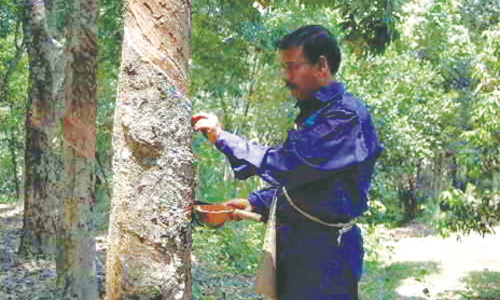BFIDC depots glut with rubber
More than 5,000 tonnes of rubber remained unsold at depots of the state-owned producers as the local market has been flooded with raw rubber imported from neighbouring countries taking advantage of low duty. Bangladesh Forest Industries Development Corporation is facing a tough time to clear the stock, the quantity of which is almost equivalent to its annual production, after finance minister AMA Muhith lowered the import duty on the item to 5 per cent for the private gardeners in 2013-14. Taking the advantage of low duty, the private rubber gardeners are importing raw rubber from Vietnam, Thailand, Malaysia, Sri Lanka, India and Korea.
Bangladesh Bank data showed that rubber worth US$ 52 million had been imported from India and Malaysia alone in the first six months of the current year. But even several years ago, 60 per cent locally grown rubber was used in local industries while the rest was exported. The BFIDC officials said the local rubber producers are subjected to pay 23 per cent tax including 15 per cent Value Added Tax since 2010 to market locally grown rubber. But more than a dozen of private gardeners filed writs against the move in the High Court in 2011. They are not paying 15 per cent VAT as the matter remained pending with the High Court, they said. They said the BFIDC was now facing twin problems to market their products due to low import duty and payment of VAT. They said they were incurring losses. They predicted that the stockpile would go up further as the raw rubber harvest season has started and will continue until next January.
They expressed dissatisfaction as the BFIDC’s demand for increasing duty by at least 25 per cent for the import of raw rubber has not been considered. They alleged that National Board of Revenue has been delaying to respond to the BFIDC demand. Abdul Quader, a director of BFIDC, made the appeal in a letter to the ministry of finance and the NBR on October 2. He urged that the NBR should enhance the duty on import of raw rubber for the survival of the state-owned rubber growers and betterment of the country’s rubber sector. Rubber-based industries produce plastic, glue, tyre and tube, etc. the industries for which were developed in the country. A number of small-scale latex factories generated employment. Bangladesh’s demand for rubber will be 100,000 tonnes in 2020, for which 150,000 acres of land will have to be brought under cultivation. -
See more at: http://newagebd.net/68309/bfidc-depots-glut-with-rubber/#sthash.wB6EhdXL.dpuf











